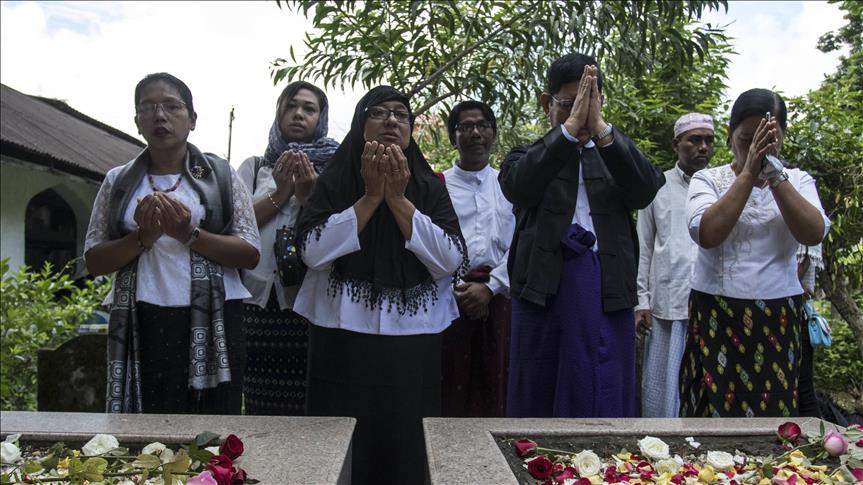Myanmar ignores ethnic divisions to honor Muslim martyr
One of 8 men assassinated alongside country’s founding father in 1947 was highly respected Muslim politician

Yangon
By Kyaw Ye Lynn
YANGON, Myanmar
Thousands of people of all faiths cast aside religious and ethnic differences early Tuesday to pay respect to the country's heroes of independence at the Martyrs’ Mausoleum in Myanmar’s commercial capital Yangon.
Each year on July 19, events take place countrywide, but for Myanmar's minority Muslim population Martyr's Day has taken on extra significance as many feel the secularism encouraged by one man is now under threat from a surge in Buddhist nationalism.
Of the eight men assassinated alongside the country’s founding father in 1947, one was a highly respected Muslim politician, Abdul Razak, who paved the way for what was initially a secular state in the majority Buddhist country.
“He deeply believed in secularism. He respected religion and the culture of others. That’s why everyone admires him,” Razak's son said of his father to Anadolu Agency at Yangon's Muslim cemetery.
“During their fight for independence, they just focus on national interest,” recalled Tin Myint, who was just six years old when his father died.
“No one looks at the religion at that time."
July 19 is a national holiday in Myanmar, as it marks the 69th anniversary of the death of Gen. Aung San -- State Counselor Aung San Suu Kyi's father -- seven other leaders, and a bodyguard during a cabinet meeting of the pre-independence interim government.
The incident happened one year before the country became independent from colonial power Britain in 1948.
Outside of visits to the Secretariat building -- where four gunmen opened fire at 10.37 a.m. (0405GMT) -- people also visit Bogyoke Aung San Museum -- a home near the landmark Shwedagon pagoda in Yangon’s Bahan Township -- in which Gen. Aung San lived with his family for just over two years before he was assassinated.
And then, dozens of people -- mostly Muslims -- visit the cemetery in Yangon’s Tarmwe Township where the graves of two national heroes -- Education and National Planning Minister Abdul Razak, and his bodyguard Ko Htwe -- lie.
Born in the central town of Meiktila in 1898 to Muslim father Sheik Abdul Rahman and Buddhist mother Nyein Hla, Razak studied in Mandalay and Yangon and earned his bachelor degree in English in 1922.
He then became involved in a national movement against the education system provided by the British colonizers since 1921 by founding a national school in the country's second largest city Mandalay where he served prior to the Japanese invasion of Myanmar (then Burma).
On Tuesday, Si Thu Maung, a 28-year-old Muslim student leader and former political prisoner, told Anadolu Agency how proud he was of Razak's role in the rise against colonial rule.
Prior to Myanmar's present problems over race and religion, those of all faiths came together to fight the British and then the country's years of military rule.
“I feel proud of Muslims’ active involvement in the country’s fight for independence and democracy,” said Si Thu Maung, one of the many arrested and imprisoned following the monk-led peaceful demonstrations of 2007, that became known as the Saffron Revolution.
“Martyrs’ Day reminds people that Muslims are an important part of country,” he told Anadolu Agency by phone.
Everyone, however, does not share Si Thu Maung’s appreciation of Myanmar’s Muslim population.
Among the many visitors to the Martyrs’ Mausoleum on Tuesday was a group of ultra-nationalists, who left the names of Razak and Ko Htwe from the list of martyrs on an invitation letter calling on comrades to join them.
“No, it isn’t a mistake. It’s intentional,” Narinda, a monk belonging to the Nationalist Brotherhood and Sisterhood Network, stated to Anadolu Agency on Tuesday.
“They are not martyrs for us,” he said.
Others strongly disagree.
A prominent politician from the Peace and Open Society underlined to Anadolu Agency that whatever Myanmar's future, history would never allow the names of Razak and Ko Htwe to be erased or distorted.
“A genuine ruby won’t sink and disappear in mud,” 88 generation student leader and Buddhist, Ko Ko Gyi told Anadolu Agency by phone utilizing a famous Myanmar proverb.




